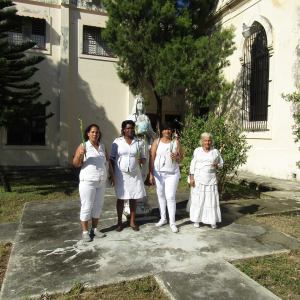In October 1958, the city of Palma Soriano fell into the hands of the rebel troops commanded by Fidel Castro, who declared it the first capital of the Revolution on that very day. Today it is perhaps the city with most opponents against the communist regime.
We spoke with Denia Fernández Rey, representative of the opposition group Hermanas de Blanco (“White Sisters”) in the Santiago de Cuba province, who records repressive acts perpetrated against the residents of Palma Soriano. She told us about some of the most recent cases:

“A fellow member of our group, Alexander Carrión Licea, aged 58, was accused of the crime of receiving, but he did not commit any: he only bought a tarpaulin in July because he wanted to make a roof to protect himself and his family from the rain as his suburb became one of the sites most affected by Hurricane Sandy, an unwelcome visitor which hit the area several years ago. The government has not resolved his case so far. The thing is, he can’t even cover the roof with zinc sheets due to his opponent status. Every time they start working on it, they are prevented from finishing it. The day after buying the tarpaulin he was summoned by the Police and fined. After having refused to sign the statement, he was accused of contempt and now he must stand trial, where he will surely end up very badly.”
Denia says that she receives many reports of such cases where also other people than members of opposition groups are involved.
“Many people come to us to denounce the injustices they suffer. Recently, several disabled people who work in a workshop of a local industries company came to report that they had not received salary for 2 months. They have formed a union of more than 120 people with sight and hearing problems. So, we got to investigating the issue and we learned from the bank that the company did not have funds to cash the issued checks. We wrote a claim letter and sent it to the company. At that moment, the case was taken over by the Political Police, which threatened us that if we continued interfering in the matter, even the deaf and the blind would go to prison with us.”
Denia has been a pro-democracy activist since 2010. In Palma Soriano she is known as a great defender of human rights approached by citizens who find themselves cornered by the system – they see her as the source of salvation (perhaps the last).
“Sometimes it’s impossible, but we feel it’s our duty to make public denunciations, to make those cases known both in Cuba and in the world. Yesterday, an old woman came to my house, her name was Leydis Lupe Isaac Vega. She said she went to her electrical power supplier to file a complaint about an erroneous meter reading – according to the monthly receipt she received, she was to pay a huge sum, but she is a poor woman who has barely any home appliances. No one from the company came to her place to check the meter and find the cause of such an absurd amount. When she failed to pay the bill, the company cut off her power supply. She has a sick son who needs special care, so she restored the power supply in her home by her own means. The next day she was visited by a patrol man known as Patrullero 671, who is famous for being more than willing to perpetrate repressive acts in Palma Soriano. He took the old woman to the Police station, where the State Security official known as Miguelito 1500 was already waiting for her. She was imposed a fine of 1500 pesos for an alleged crime of disorderly conduct.”
Although Denia Fernández and her group of Hermanas de Blanco are constantly subject to repression by the Political Police, she says that she prefers to spread news of cases of repression against ordinary citizens, not those against members of her group.
“Those are precisely cases of human rights violations that nobody knows of, that are lost in anonymity and oblivion. From my point of view, such cases are more important than those that are perpetrated against our group and that’s why it is so important to highlight them. When a disabled person, a pregnant woman or an elderly citizen comes to us with a complaint, we mobilize ourselves and concentrate all our efforts on giving that person all our attention and help we can. Sometimes it’s just enough to report such cases, but it happens rarely. The truth is that we take their problems as our own, which is the only way to achieve something.”

Leave a comment